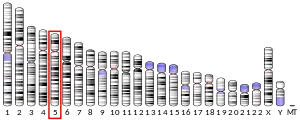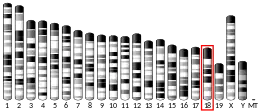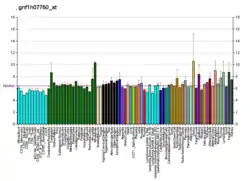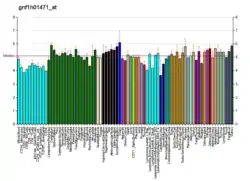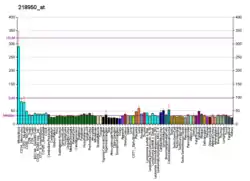CENTD3
Arf-GAP with Rho-GAP domain, ANK repeat and PH domain-containing protein 3 is a protein that in humans is encoded by the ARAP3 gene.[5][6][7]
| ARAP3 | |||||||||||||||||||||||||||||||||||||||||||||||||||
|---|---|---|---|---|---|---|---|---|---|---|---|---|---|---|---|---|---|---|---|---|---|---|---|---|---|---|---|---|---|---|---|---|---|---|---|---|---|---|---|---|---|---|---|---|---|---|---|---|---|---|---|
| |||||||||||||||||||||||||||||||||||||||||||||||||||
| Identifiers | |||||||||||||||||||||||||||||||||||||||||||||||||||
| Aliases | ARAP3, CENTD3, DRAG1, ArfGAP with RhoGAP domain, ankyrin repeat and PH domain 3 | ||||||||||||||||||||||||||||||||||||||||||||||||||
| External IDs | OMIM: 606647 MGI: 2147274 HomoloGene: 11199 GeneCards: ARAP3 | ||||||||||||||||||||||||||||||||||||||||||||||||||
| |||||||||||||||||||||||||||||||||||||||||||||||||||
| |||||||||||||||||||||||||||||||||||||||||||||||||||
| |||||||||||||||||||||||||||||||||||||||||||||||||||
| |||||||||||||||||||||||||||||||||||||||||||||||||||
| Wikidata | |||||||||||||||||||||||||||||||||||||||||||||||||||
| |||||||||||||||||||||||||||||||||||||||||||||||||||
This gene encodes a phosphoinositide binding protein containing ARF-GAP, RHO-GAP, RAS-associating, and pleckstrin homology domains. The ARF-GAP and RHO-GAP domains cooperate in mediating rearrangements in the cell cytoskeleton and cell shape. It is a specific PtdIns(3,4,5)P3/PtdIns(3,4)P2-stimulated Arf6-GAP protein. An alternatively spliced transcript has been found for this gene, but its full-length nature has not been determined.[7]
References
- GRCh38: Ensembl release 89: ENSG00000120318 - Ensembl, May 2017
- GRCm38: Ensembl release 89: ENSMUSG00000024451 - Ensembl, May 2017
- "Human PubMed Reference:". National Center for Biotechnology Information, U.S. National Library of Medicine.
- "Mouse PubMed Reference:". National Center for Biotechnology Information, U.S. National Library of Medicine.
- Krugmann S, Anderson KE, Ridley SH, Risso N, McGregor A, Coadwell J, Davidson K, Eguinoa A, Ellson CD, Lipp P, Manifava M, Ktistakis N, Painter G, Thuring JW, Cooper MA, Lim ZY, Holmes AB, Dove SK, Michell RH, Grewal A, Nazarian A, Erdjument-Bromage H, Tempst P, Stephens LR, Hawkins PT (Jan 2002). "Identification of ARAP3, a novel PI3K effector regulating both Arf and Rho GTPases, by selective capture on phosphoinositide affinity matrices". Mol Cell. 9 (1): 95–108. doi:10.1016/S1097-2765(02)00434-3. PMID 11804589.
- Santy LC, Casanova JE (May 2002). "GTPase signaling: bridging the GAP between ARF and Rho". Curr Biol. 12 (10): R360–2. doi:10.1016/S0960-9822(02)00860-6. PMID 12015138. S2CID 15875666.
- "Entrez Gene: CENTD3 centaurin, delta 3".
External links
- Human ARAP3 genome location and ARAP3 gene details page in the UCSC Genome Browser.
Further reading
- Raaijmakers JH, Deneubourg L, Rehmann H, et al. (2007). "The PI3K effector Arap3 interacts with the PI(3,4,5)P3 phosphatase SHIP2 in a SAM domain-dependent manner". Cell. Signal. 19 (6): 1249–57. doi:10.1016/j.cellsig.2006.12.015. hdl:1874/35664. PMID 17314030. S2CID 356352.
- Lu Q, Wei W, Kowalski PE, et al. (2005). "EST-based genome-wide gene inactivation identifies ARAP3 as a host protein affecting cellular susceptibility to anthrax toxin". Proc. Natl. Acad. Sci. U.S.A. 101 (49): 17246–51. doi:10.1073/pnas.0407794101. PMC 534609. PMID 15569923.
- I ST, Nie Z, Stewart A, et al. (2005). "ARAP3 is transiently tyrosine phosphorylated in cells attaching to fibronectin and inhibits cell spreading in a RhoGAP-dependent manner". J. Cell Sci. 117 (Pt 25): 6071–84. doi:10.1242/jcs.01526. PMID 15546919.
- Ota T, Suzuki Y, Nishikawa T, et al. (2004). "Complete sequencing and characterization of 21,243 full-length human cDNAs". Nat. Genet. 36 (1): 40–5. doi:10.1038/ng1285. PMID 14702039.
- Reinhard C, Schweikert M, Wieland FT, Nickel W (2003). "Functional reconstitution of COPI coat assembly and disassembly using chemically defined components". Proc. Natl. Acad. Sci. U.S.A. 100 (14): 8253–7. Bibcode:2003PNAS..100.8253R. doi:10.1073/pnas.1432391100. PMC 166215. PMID 12832619.
- Strausberg RL, Feingold EA, Grouse LH, et al. (2003). "Generation and initial analysis of more than 15,000 full-length human and mouse cDNA sequences". Proc. Natl. Acad. Sci. U.S.A. 99 (26): 16899–903. Bibcode:2002PNAS...9916899M. doi:10.1073/pnas.242603899. PMC 139241. PMID 12477932.
This article is issued from Wikipedia. The text is licensed under Creative Commons - Attribution - Sharealike. Additional terms may apply for the media files.
